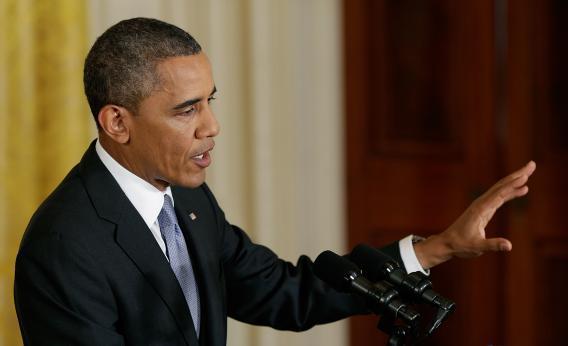At a press conference on Friday, President Obama vowed to bring new surveillance reforms following recent disclosures about the NSA’s secret spy programs. But the commander-in-chief failed to address the latest snooping revelations, which have put the spotlight the extent of the government’s ability to sweep up Americans’ communications without a warrant.
The New York Times reported Thursday that the NSA was “searching the contents of vast amounts of Americans’ e-mail and text communications into and out of the country, hunting for people who mention information about foreigners under surveillance, according to intelligence officials.” This report was then compounded Friday by a new Guardian scoop claiming that the NSA “has a secret backdoor into its vast databases under a legal authority enabling it to search for U.S. citizens’ email and phone calls without a warrant.”
There has been an avalanche of reports about the NSA in recent weeks. So many, in fact, that it has been hard to keep track at times. But the two stories from the Times and the Guardian are particularly noteworthy. They shed light on how a controversial 2008 amendment to the Foreign Intelligence Surveillance Act is being used by NSA spies to mine through Americans’ data in a way that has not been publicly acknowledged by officials, who have been seeking to play down the extent of the NSA’s capabilities. The legal rationale illustrates how the NSA can feasibly use a system called XKEYSCORE, which stores masses of data that is apparently siphoned directly off of Internet networks, to “inadvertently” sift through Americans’ communications without a specific warrant. (It remains unclear whether the NSA is able to snoop on data lifted directly off of networks that is sent using SSL encryption over an HTTPS connection.)
In June, leaked secret rules exposed how the NSA could inadvertently gather information about Americans and store it on the vague grounds that the communications “are, or are reasonably believed likely to become, relevant to a current or future foreign intelligence requirement.” The NSA also has authority to pass these communications to other agencies, the rules showed, if they are believed to show evidence of a crime. An exclusive from Reuters on Wednesday revealed how this functions in practice, allowing the DEA to receive communications collected by the NSA. The drug agency can then use that information to initiate legal proceedings—and has been doing so while concealing the details from judges.
However, President Obama did not directly address any of these important issues at the news conference Friday, when he publicly addressed the mounting backlash over NSA surveillance. Obama made a significant commitment to reforming the section of the Patriot Act that has allowed a vast domestic phone records database, and he also vowed to bring in adversarial process to the secret Foreign Intelligence Surveillance Court, which currently hears only the government’s side of the argument. But Obama did not address specific concerns about the 2008 FISA amendment, and he continues to play down revelations about the extent of the NSA’s ability to warrantlessly snoop on Americans’ communications, insisting that the government is only monitoring bad guys. “What you’re not reading about is the government actually abusing these programs,” Obama said. He failed to mention that his administration is actively working to keep secret details about the abuse.
